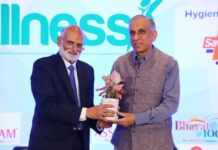New Delhi, March 08, 2019: In an important step towards improving the diet and health outcomes of Indians, the Food Safety and Standards Authority of India (FSSAI) has proposed amendments to the Food Safety and Standards (Food Products Standards and Food Additives) Regulations 2011 to limit trans-fatty acids in all oils and fats to ‘not more than 3% by January 2021 and to ‘not more than 2%’ by January 2022. Many civil society representatives and consumer activists have welcomed this policy amendment as a significant milestone towards aligning India’s regulation of trans-fatty acids (trans fats) with the World Health Organization’s (WHO) call for global elimination of industrially-produced trans-fat by 2023.
Welcoming FSSAI’s continued commitment to ensuring a safer and more nutritious food chain, Dr Anjali Borhade, Director, Disha Foundation said, “India has taken timely steps towards achieving the WHO goal of zero trans fats by 2023. It is now critical that these laws are enforced across the country. The civil society must work in tandem with FSSAI and state level food authorities to ensure that the industry complies with the proposed regulation. However, the proposed regulation’s narrow application to fats and oils —and failure to cover foods—is a significant gap.”
The WHO REPLACE action package defines best-practice policies for elimination of industrially-produced trans fat as those that limit trans fat to 2% of fats and oils in all foods. In its current form, the Indian regulation only limits trans fats in oils and fats but not all foods. Therefore certain foods, specifically imported foods containing high trans fats may continue to be available in Indian market.
In 2016, 2.75 million Indians died due to heart diseases and it is expected that this number will rise at an alarming rate in the coming years. More and more young people are considered to be at risk. A 2% higher intake in trans fats increases the risk of death from heart disease by 28%.
Applauding the steps taken by FSSAI to limit trans fats in oils and fats to 2%, Dr Nikhil Tandon, Head of the Department of Endocrinology and Metabolism at All India Institute of Medical Sciences said, “It is heartening to note that the FSSAI, Government of India has taken necessary regulatory steps towards achieving the WHO goal of zero trans fats by 2023. A concerted effort is required from all the stakeholders to ensure that the regulatory efforts transition to action at the earliest.”
Partially hydrogenated oils (PHO) are the main source of industrially-produced trans-fat. PHO is an ingredient in many foods, including margarine, vegetable shortening, Vanaspati; fried foods and doughnuts; baked goods such as crackers, biscuits, sweets. Baked and fried street and restaurant foods also often contain industrially-produced trans fat. Dr Seema Gulati, Head Nutrition Research Group, Diabetes Foundation (India) cautioned about the need to generate awareness regarding sources and harmful effects of TFA. “Apart from use of hydrogenated fat (Vanaspati and bakery shortening), wrong cooking practices such as re-use of cooking oil, repeated deep frying are common in India. While FSSAI’s step to reduce TFA to 2% in commercially available foods is much appreciated, correct cooking practices should also be followed at home.”
Ms Opinder Preet Kaur, President Generation Saviour Association, an NGO working for better health of the youth in Punjab said, “This regulation is particularly important for Punjab, one of the three states with highest prevalence of cardiovascular diseases. The proposed amendment will go a long way in regulating trans fats.”
Several countries have eliminated industrially-produced trans fats from the food supply through robust implementation of related laws. Policies to eliminate trans fats have been shown to work. For instance, a ban on trans fats in NYC restaurants was shown to both reduce serum concentrations of trans fats and to reduce hospitalizations from heart disease.
Disha Foundation works with marginalised social groups on improving their access to health, food security, livelihood and education. It is working on creating awareness about various risks factors for CVD.
Corporate Comm India(CCI NewsWire)




















